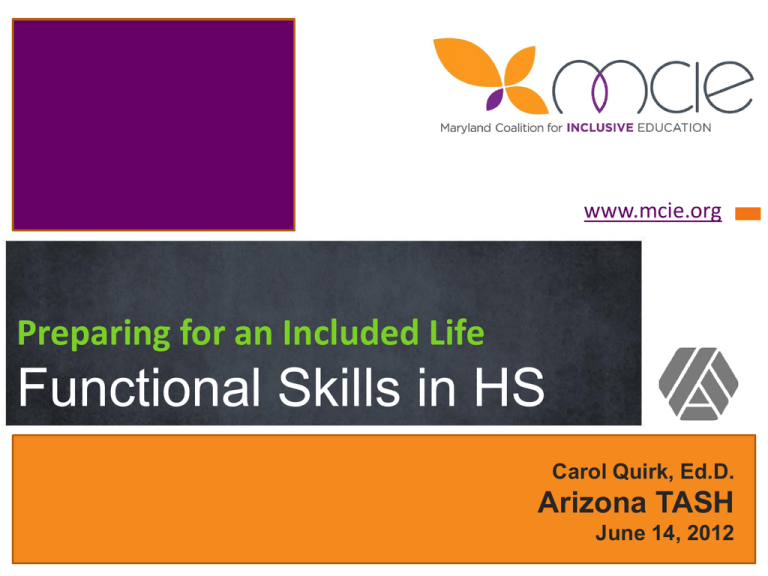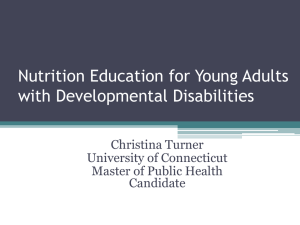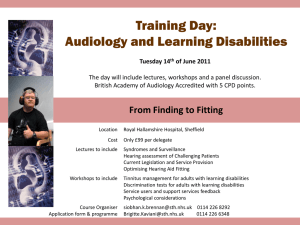Work experience
advertisement

www.mcie.org Preparing for an Included Life Functional Skills in HS Carol Quirk, Ed.D. Arizona TASH June 14, 2012 Why go to school? ...to ensure that all children with disabilities have available to them a free appropriate public education that emphasizes special education and related services designed to meet their unique needs and prepare them for further education, employment, and independent living... IDEA 2004 Being Included is… Being THERE WITH same age peers WHERE they learn and socialize Having a sense of BELONGING Membership in the school community Having friends Learning Communication/Socialization skills Post-School employment skills Young Adults with Significant Disabilities Carter, E. W., Austin, D., & Trainor, A. A. (in press). Predictors of Prior Work History postschool employment outcomes for young adults with severe disabilities. Journal of Disability Policy Studies. Student Demographic Factors Current FamilyRelated Factors Work Status SkillRelated Factors How Do Young Adults with Significant Disabilities Fare? SchoolRelated Factors The Early Years After Exiting High School Young Adults with Significant Disabilities Prior Work History PAID Community Based JOBs 25-30% employed 43% employed in jobs with other workers how have a disability For 21 hours/week or less Average pay = $6.15 • • • • Food Filth Flowers Folding And SHREDDING! Predictors of Employment Goal of attending a two or four year college 11% of students with ID had this goal 58% students with other disabilities had this goal Goal of paid community-based employment 33% of students with ID had the goal of sheltered employment 8% of students with other disabilities had goal of sheltered employment Grigal, Hart, & Migliore, 2011 Employment Outcomes for Youth with ID and/or ASD 100% 90% 26% 80% 70% 60% 50% 8% 71% 21% Not working Sheltered Job 40% 30% 20% 45% 10% 0% Intervention 11% 7% 11% Unpaid Community Job Paid COMMUNITY Job Comparison Carter, E. W., Trainor, A. A., Ditchman, N., Swedeen, B., & Owens, L. (2009). Evaluation of a multicomponent intervention package to increase summer work experiences for transition-age youth with severe disabilities. Research and Practice for Persons with Severe Disabilities, 34, 1-12. Employment Outcomes for Youth with Disabilities When youth spend two years in a postsecondary college experience 26% more likely to leave Vocational Rehabilitation with paid employment 73% higher weekly income Data Set: RSA 911 Migliore, A., Butterworth, J., & Hart, D. 2009. Postsecondary Education and Employment Outcomes for Youth with Intellectual Disabilities. Fast Facts Series, No. 1. Boston, MA: Institute for Community Inclusion The Think College Standards for Inclusive Higher Education www.thinkcollege.net © Think College 2012 OLD Definition of Functional Skills 1979 “Functional Skills refer to the variety of skills that are frequently demanded in natural domestic, vocational, and community environments.” Brown, Branston, Hamre-Nietupski, Pumpian, Certo, & Gruenewald. (1979). A strategy for developing chronological age appropriate and functional curricular content for severely handicapped adolescents and adults. The Journal of special Education 13(1). 1989: “Functional/critical skills… include skills/activities that are required or expected of nonhandicapped peers. These skills are essential to the student’s performance and participation in a variety of community environments. Falvey, M. (1989). Community-based curriculum: instructional strategies for students with severe handicaps. Baltimore: Brooks. New Definition of Functional Skills 1998: “…skills such as communication, cooperation, problem solving, self-initiation, responsibility …have been shown to be more related to job stability than the ability to perform specific vocational tasks.” “… the academic and social benefits of inclusion rely on students being full-time members of general education classes and their school communities.” Jorgensen, C.M (1998). Restructuring high schools for ALL learners: Taking inclusion to the next level. Baltimore: Brooks. Life Skills Collaboration Computer use Problem solving Communication Functional College/Career Readiness Skills Communication competence (need access to AAC!) Academic content (especially literacy) Social skills Work behavior Knowledge of how to access supports Criteria 1. Age-Appropriate 2. Required now to participate in school/work 3. Required as an adult for employment or home 4. Improves communication/social interactions 5. Promotes self-determination Instead of: Consider: Science lab Follow a picture recipe Given written directions with picture cues, complete a task of up to 5 steps Social studies project Classroom job Book report Instead of: Read 20 community safety words Consider: Recognize and respond to key printed words in context Curriculum vocabulary words Key words in math problems Signs and labels in the building It’s not just about participation, it’s about OUTCOMES Inclusion Jobs High Expectations Case Study-Keith • Strengths decodes up to 2nd grade computes single digits transitions to class independently Follows 1-2 step directions motivated to work Case Study-Keith • Interests The WEATHER COOKING BASEBALL GIRLS COMPUTER • Preferences Predictability of routine and staff Female teachers Peer supports Social praise and ‘high fives’ Working on some tasks independently Case Study-Keith • Needs Support with: Reading Word problems Math (e.g., budgeting, money) Organization skills (often loses things) Initiating conversation Answering questions Making decisions Initiating an activity if not directed English / Language Arts (A/B) Algebra (A/B) Earth Science (A) American Gov. (B) Health / P.E. Elective (A) Applied Nutrition Elective (B) S will recognize CVC words and decode them appropriately. S will be able to identify word families (e.g., ou, oi, oy, ie, ea) and decode the words appropriately. Reading Comprehension When given text or portion of the text, S will read to gain information as evidenced by identifying the main idea and supporting details. After reading a short story, S will correctly answer comprehension questions about the story. Using internet and print material, S will research and discuss at least one career of interest. Expressive Language X X X X X X Given a question, provide response within 20 seconds (with 100% accuracy with no more than 1 verbal prompt) When faced with an unfamiliar person or situation (substitute teacher, change in X X X X X X IEP Matrix of Objectives Decoding / Phonics X X X X X X X X X X X X X X X X X X X X X IEP Matrix of Objectives English / Language Arts (A/B) Algebra (A/B) Earth Science (A) American Government (B) Health / P.E. Elective (A) Applied Nutrition Elective (B) X X Math Calculation When given a verbal and visual cue for the total amount for a purchase (e.g., lunch, drink, snack, or an item from the school store), S will use the ‘next dollar-up’ strategy to make purchases. When given an item in need of measurement (e.g., during earth science lab, algebra, margins for written products in English), S will measure accurately in millimeters, centimeters, and inches. Given a set of addition and subtraction problems, with decimals to the hundredths place, S will correctly perform the calculations X X X X X Written Language Expression When given a short sentence from dictations, S will write what he has heard and apply appropriate spelling and capitalization rules X X X X When given a topic or a writing prompt, S will write 4-5 related sentences and utilize appropriate spelling, capitalization, and punctuation rules When given a registration form (e.g. for a club or a sport), S will be able to write his personal information with 100% accuracy for 4 out of 5 trials X X X X X X X X Planning Supports: Information About the Class When: What students are expected to do: The teacher is lecturing Sit quietly in seat Take notes Answer questions Students are working in cooperative groups Perform assigned role Take turns Listen Respect opinions of others Students are doing individual seat work Work in assigned area Complete activity Ask for help if needed Putting It All Together When: What students are expected to do: What Keith will do: Supports: The teacher is lecturing Sit in seat Listen Take notes Answer questions Sit in seat Listen Answer one question Pre-teaching of answer Partner to take notes Copy of notes / Highlighter Peer support to prompt answer Students are working in cooperative groups Perform assigned role Take turns Listen Respect opinions of others Perform one role (same over time) Wait for turn until a peer prompts him Listen Visual schedule of tasks Review of cooperative group rules prior to starting Pre-Teaching Peers to support participation Students are doing individual seat work Work in assigned area Complete activity Ask for help if needed Work in area Complete modified activity Use “help” card to request assistance Choice of area in which to work “Help” card Keith’s Action Plan Activity To Do Whole Group/Lecture Highlight important points Seat back to middle (not in front) Prepare additional activity for long lecture Provide prompts as needed for questions Small Group/Indepen dent Work Assign role Provide opportunities to write/copy Encourage modeling by peers Use books, drawing, and practice work Academic Content Preview lessons and make accommodations/modifications as needed Lunch Provide reminders to not continue talking /supervision to help with pacing Substitute Teacher Check on adult support when this happens; remember to provide reminders about the change in schedule if scheduled to be out By Whom? Gen Educator, Special Educator, Para Special Educator 9th Grade Schedule Monday Tuesday Wednesday Thursday Friday A Day B-Day A Day B-Day A Day Applied Nutrition Health / P.E. Applied Nutrition Health / P.E. Applied Nutrition Essentials of Algebra Algebra- Essentials of Algebra Algebra Essentials of Algebra Language Arts Reading Intervention Language Arts Reading Intervention Language Arts Earth Science American Govt. Earth Science American Govt. Earth Science 10th Grade Schedule Monday Tuesday Wednesday Thursday Friday A Day B-Day A Day B-Day A Day Biology World History Biology World History Biology Skills Class Career Assess & SLed IEP Geometry Skills Class Career Assess & SLed IEP Geometry Skills Class Career Assess & SLed IEP English Language Arts-CT Reading Interventi on English Language Arts-CT Reading Interventio n English Language Arts-CT Keyboarding Intro to Technology Keyboarding Intro to Technology Keyboarding 11th Grade Schedule Monday Tuesday Wednesday Thursday Friday A Day B-Day A Day B-Day A Day Psyhology Reading Intervention Psychology Reading Intervention Psychology Applied Nutrition II Team Sports Applied Nutrition II Team Sports Applied Nutrition II Environ. Science U.S. History Environ. Science U.S. History Environ. Science Work experience Career Research and Develop. Work experience Career Research and Develop. Work experience 12th Grade Schedule Monday Tuesday Wednesday Thursday Friday A Day B-Day A Day B-Day A Day Applied Nutrition-III Advanced Technology Applied Nutrition-III Advanced Technology Applied Nutrition-III English Language Arts-CT Reading Intervention English Language Arts-CT Reading Intervention English Language Arts-CT Math Applications Work experience Math Applications Work experience Math Applications Art Work experience Art Work experience Art Outside of class… Extracurricular Activities • Clubs Participant • Athletics Manager Participant Score Keeper Concession Ticket Sales Spectator Post School Schedule Monday Tuesday Wednesday Thursday Friday Computer class Work at campus catering Computer class Work at campus catering Computer class One-Stop Center Resume Work at campus catering One-Stop Center Resume Work at campus catering One-Stop center Resume Comm. Based Instruction Work at campus catering Comm. Based Instruction Work at campus catering Comm. Based Instruction Comm. Based Instruction Mobility instruction home Comm. Based Instruction Mobility instruction home Comm. Based Instruction THANK YOU! www.mcie.org Questions, Comments, Thoughts






